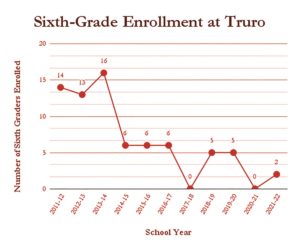TRURO — When Caroline Townsend was finishing fifth grade at Truro Central School (TCS) in 2012, her parents asked her which sixth grade option she preferred: board the bus for Nauset Regional Middle School in Orleans or stay in Truro? Townsend, with her friends, chose the latter.
One year later, she graduated from TCS and joined other Outer Cape students at Nauset for seventh grade. “But once we got there,” Townsend said recently, “the other kids seemed to be a step ahead of us.”
She felt blindsided by her technology and engineering class, which built on topics covered in Nauset’s sixth-grade curriculum. “Everyone from Truro was like, ‘What the heck is this? We didn’t learn this,’ ” said Townsend, now a junior at UMass Amherst. “Science caught us off guard.”
The new seventh-graders found that social cliques in their class had had a year to crystallize. In the lunchroom, the newcomers were sequestered to what the middle schoolers called “the Truro table.”
Truro parents have mostly caught on to the academic and social issues associated with parachuting into Nauset in the seventh grade. As a result, sixth-grade enrollment at TCS has plummeted in recent years. But the tuition arrangement between Truro and the Nauset schools is an incentive for school administrators to keep the struggling program in place.
Truro Supt. Stephanie Costigan expected only two students in the sixth grade this year, which would not make for a “healthy-sized classroom for any age group,” she told the school committee in September.
She proposed combining the sixth grade with the fifth, with 16 students, but parents objected. The two grades remained separate.
Sixth-grade enrollment took a nosedive in 2014. The year before, TCS had 16 sixth-graders; in 2014, the class had just six. In 2017-2018 and 2020-2021, the school had no sixth-graders at all.

Whether the sixth grade stays or disappears has fiscal implications.
Under the town’s current tuition agreement, the Nauset Regional Schools offer Truro students enrollment in grades 7 to 12. The five-year pact runs through 2023-2024. This year, Truro pays tuition of $19,392 per student.
Sixth grade isn’t bundled into the deal because TCS has its own. But families can still send their sixth-graders to Nauset through the state’s school choice program. For fiscal 2021, the tuition for a Truro sixth-grader going to Nauset under school choice was just $5,000.
If TCS does away with its sixth grade, Truro would need to revise its tuition agreement with Nauset, and the town would be on the hook for the higher tuition. “As long as we legally have a sixth grade, we’ll continue to offer it,” said Costigan. “And if students leave, we’ll pay the $5,000.”
Families of fifth-graders generally begin thinking about their sixth-grade options in January and February. TCS advertises its program. “It’s a super individual decision for every family and student,” said Kolby Blehm, the school committee chair.
“Some students have special education needs that are better met in Truro’s smaller setting,” said Costigan. TCS contracts with Gosnold, which sends counselors to the school, where students can bee seen through their private insurance plans. “That way, families don’t have to travel 45 minutes to get to the doctor,” Costigan said.
“To entice more families to stay, we added some really special elements in 2014,” she added. Two cohorts of sixth-graders went every week to the Hyannis Maritime Museum and learned how to build a skiff from scratch. TCS had always done a four-day trip to Washington, D.C., but in 2018, the sixth-graders polished up their verb conjugations and put their Spanish skills to the test in Puerto Rico.
In 2015-2016, Helen Grimm’s twins, Anders and Ella, attended TCS for such experiences, including visiting an oyster grant and picking cranberries at a local farm. “It was wonderful to be in this intimate setting, exploring all kinds of things that wouldn’t happen in a typical middle school day,” Grimm remarked.
Despite TCS’s unique offerings, Heather Peters Reis made up her mind about sixth grade when her daughter, Nina, was in preschool. Heather teaches sixth grade at Monomoy Regional Middle School in Chatham.
“TCS is an amazing school,” she said. “But it’s an elementary school.”
By the end of fifth grade, Peters Reis felt, Nina was ready for some independence: taking the bus to Nauset, navigating crowded hallways, seeing unfamiliar faces, and making new friends.
“We recommend that students do sixth grade here,” said Shelby Williams, Nauset’s sixth-grade counselor. “It’s in their best interest. The entire sixth-grade year, teachers are guiding them through how to be a middle school student. But the seventh-grade teachers pretty much expect that they know these expectations.”
Peters Reis, who is familiar with state standards, said she “anticipated Nina would struggle with the math curriculum.” Going to Nauset for the sixth grade, she hoped, would help keep Nina from falling behind.
“I had trouble at first,” Nina told the Independent. “I’d go to other kids and ask, ‘Can you help me with this?’ ” Long division was troublesome, she said, not to mention multiplying fractions.
Until 2014, TCS used Everyday Math, a curriculum developed by the University of Chicago School Mathematics Project, but it didn’t align with Nauset’s approach. “We were getting feedback from our students that they were experiencing difficulties when they transitioned in math,” Costigan said.
TCS then switched to the Investigations curriculum, which prioritizes establishing a “solid foundation of number sense,” Costigan said, before moving on to algorithms.
“The kids get really good at manipulating numbers,” she continued, “but it doesn’t teach algorithms until later, in the fourth and fifth grade, so the kids haven’t mastered it by the time they’re moving on — which I think might be where the rub is. That’s what I hope to dig down deeper into.”



